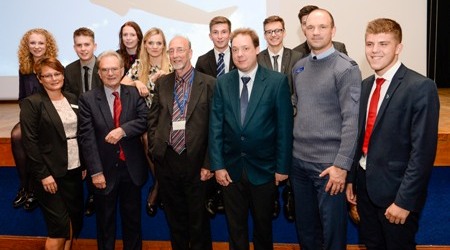Institution news
This year’s inspiring talk – on an exciting next step for space travel – was given by Philippa Davies MEng CEng MIMechE, who was invited to speak by the Sir Isaac Newton Lecture Committee, chaired by Barrie Fitton BSc MSc CEng FIMechE.
Barrie, who formerly served on Council for six years, had been inspired by the Thomas Hawksley Lecture in December 2013 by Alan Bond, founder of Reaction Engines Ltd, about a combination of jet and rocket engine propulsion for high-speed travel. Barrie enquired if a young engineer from the company would be willing to speak to 500 school students, in a prestigious arena, and was delighted that Philippa accepted.
Philippa, a Performance Engineer at Reaction Engines, previously worked at Rolls-Royce. She graduated with a First Class Honours degree from the University of Southampton in 2008 and became a Chartered Engineer with the Institution in 2012.
On behalf of the Commandant, Barrie welcomed everybody to RAF Cranwell and then spoke of the background to the Lectures, inaugurated by the Institution in 1967. He thanked the sponsors: the Institution, the IET and the Royal Aeronautical Society. President of the Institution, Group Captain Mark Hunt, was also pleased to attend, and introduced the speaker.
In a captivating speech, Philippa outlined the next possible leap in airborne travel: a hypersonic, pilotless craft which rises through the atmosphere to cruise in near-space, before descending to make a conventional landing back on earth again.
This, it is hoped, will make flights from the UK to Australia in 3.5 hours perfectly feasible, for either passengers or freight. She explained that propulsion would be by air-breathing jet engines while in the earth’s atmosphere, switching to rocket engines, with on-board fuel tanks, while in space. It represents as big a leap forward in air travel as the jet engine was when Frank Whittle (later Sir Frank) first developed it in the 1930s.
The audience – 500 local secondary school students aged 14 to 17 – listened intently to Philippa’s talk. They followed it with huge applause and a great number of intelligent and thoughtful questions, showing that they had engaged with her innovative and exciting premise, and the vision of ‘space-age’ travel.

Pictured above in the front row, left to right: event organisers Paula Bailey, Barrie Fitton FIMechE (Chairman), Philippa Davies, Trevor Kerry, Phil Hill and Flt Lt Iain Crichton.
Barrie said that feedback on the day from the students was really positive: “The whole ethos of the Lectures is to find an inspirational speaker, who can show teenage students that they can forge a career in technology. That is exactly what Philippa did: she made this innovative technology sound possible. The vital job we do with these lectures is to whet young people’s appetite for engineering.”
The Sir Isaac Newton Lectures committee consists of five volunteers: representatives of the different sponsoring Institutions, a co-opted education liaison officer and a serving RAF officer. Barrie, despite having retired, has chaired the committee since the early 2000s, and has the responsibility for speaker liaison. This year he invited Mark Hunt to attend, whom he tutored at RAF Cranwell, and was delighted that his former student was able to join the event.
Former speakers have included Adam Hart-Davies (What the Victorians Did for Us); Kate Bellingham, who has presented Tomorrow’s World, and is also a Bloodhound SSC Educational Ambassador; and Wing Commander Andy Green, pilot of Bloodhound.
Barrie is modest about the great organisational task that he and his committee undertake to make the annual lecture so popular and successful. He has dedicated many years – since the 1980s – to this important date in the Institution’s educational outreach calendar.
He enjoys putting his energies into this event for the local community and investing in the future of the engineering profession: “It is rewarding talking to the young people who come along – all the effort has been worth it as you see them enjoying the experience, and sense the thoughts lodging in their minds, maybe to be acted upon later, of pursuing a career in technology and engineering.”
Find out about the benefits of becoming a member of the Institution.